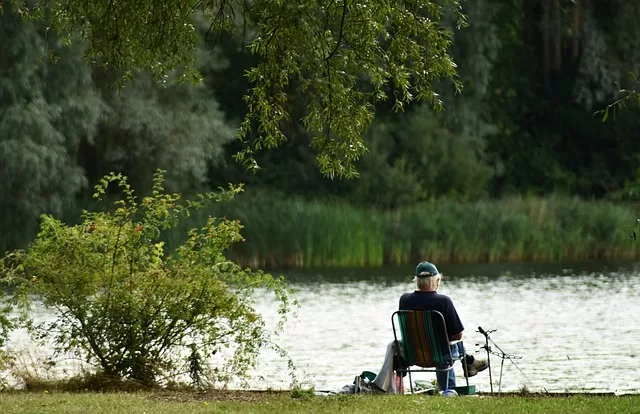Retirement Is The First Step With New Adventures.
I wish more people saw retirement as the beginning of the exciting phase of their lives.
I know some people go out into the world and have a great time, but far too often, retirement is only viewed as the end of one’s professional life.
Retirement is whatever we wish it to be and does not need to be a period marked by the cessation of daily work routines and the transition into a more leisurely pace before doing little at all.
This conventional viewpoint typically frames retirement as the end of an era, casting a shadow over the years that lie ahead.
However, this perspective is increasingly being challenged, as more individuals and experts advocate for viewing retirement not as an endpoint, but as the beginning of a vibrant and fulfilling new chapter.
Shifting our mindset from focusing on what has been left behind to embracing the opportunities that retirement offers can be transformative.
Rather than seeing retirement as a retreat from the world of work, it can be seen as a gateway to explore new passions, hobbies, and experiences that were previously sidelined due to career commitments.
This new perspective encourages retirees to engage actively with life, pursue lifelong learning, and rekindle interests that bring joy and satisfaction.
The idea of retirement as the beginning of something amazing emphasises the value of planning and preparation.
It encourages us to approach post-retirement life with the same enthusiasm and intentionality that we did during our careers.
This proactive approach can result in a more fulfilling retirement experience, full of purpose and new adventures.
By adopting this new perspective, retirees can experience a renewed sense of freedom and possibility, preparing to embark on a journey as exciting and fulfilling as their working years.
In essence, retirement should be viewed as a time to reinvent oneself, to rediscover lost interests, and to cultivate new relationships and experiences.
By adopting this mindset, we can transform retirement into a period of growth, exploration, and enjoyment, truly making it the start of something amazing.
Embracing New Opportunities With Our Retirement Phase Of Life.
Retirement is not merely an end but the beginning of a new chapter filled with endless possibilities.
The transition from a structured work schedule to an open array of choices allows retirees to explore avenues that were once sidelined due to professional commitments.
One of the most compelling aspects of retirement is the time and freedom it provides to delve into new passions and interests.
Many retirees find joy in picking up hobbies that had been put on hold. Whether it’s painting, gardening, woodworking, or learning to play a musical instrument, these activities offer a creative outlet and a sense of accomplishment.
Engaging in hobbies not only stimulates the mind but also fosters a sense of purpose and fulfillment.
Traveling is another popular pursuit among retirees. With fewer time constraints, retirees can explore new destinations, immerse themselves in different cultures, and create unforgettable memories.
Traveling provides a dynamic way to stay active and engaged, offering a refreshing change from the routine and an opportunity to see the world from a new perspective.
For some, retirement presents the perfect moment to start a new business venture. With years of accumulated experience and expertise, retirees are well-positioned to launch their own enterprises.
Whether it’s a small business, consultancy, or even a non-profit organization, this endeavor can be both professionally rewarding and personally gratifying.
Moreover, retirement offers the chance to engage in volunteer work or community service. Many retirees find great satisfaction in giving back to the community, mentoring younger generations, or contributing to causes they are passionate about.
This not only enriches their own lives but also has a positive impact on society.
In essence, retirement is a gateway to new opportunities. By embracing these pursuits, retirees can lead a vibrant and fulfilling life, making the most of this well-deserved period of freedom and exploration.
Rediscovering Passions and Interests From Our Retirement Freedom.
Retirement often marks the beginning of a new chapter, offering a unique opportunity to rediscover passions and interests that may have been set aside during the busy years of one’s career.
This stage of life provides the freedom to delve into activities that once sparked joy but were neglected due to professional and personal obligations. For many, this period is a chance to reconnect with hobbies like painting, gardening, writing, or playing a musical instrument, which can lead to an enriched and fulfilling retirement.
Painting, for example, can be a deeply therapeutic and expressive activity. Many retirees find solace and satisfaction in creating art, exploring new techniques, and perhaps even sharing their creations with others.
The act of painting allows for a creative outlet that can be both relaxing and invigorating.
Similarly, gardening offers a way to connect with nature, providing physical activity and a sense of accomplishment as one nurtures plants and watches them grow.
These activities not only fill time but also contribute to a sense of purpose and achievement.
Writing is another avenue through which retirees can explore their creativity and reflect on their experiences.
Whether penning memoirs, fiction, or even poetry, writing allows for a deep exploration of one’s thoughts and feelings, often leading to personal growth and a heightened sense of clarity. Playing a musical instrument can also be immensely rewarding.
Music has the power to evoke emotions and memories, and engaging in musical activities can enhance cognitive function and emotional well-being.
Ultimately, rediscovering passions and interests during retirement can lead to a renewed sense of purpose and fulfillment.
These activities offer more than just a way to pass the time; they provide meaningful engagement that can significantly enhance the quality of life.
By embracing hobbies and interests, retirees can find joy and satisfaction, making this stage of life a truly amazing journey.
The Joy of Travel and Exploration That Only Retirement Offers.
Retirement opens a gateway to unparalleled opportunities for travel and exploration. Freed from the constraints of limited vacation days, retirees can embark on journeys to destinations long dreamed of.
This newfound freedom allows for a deeper and more immersive travel experience, without the rush to return to work.
Whether it’s a European tour, a South American adventure, or an exploration of Asia’s rich cultures, retirees can now indulge their wanderlust fully.
The potential for cultural enrichment during retirement travel is immense. Visiting new places offers retirees the chance to engage with diverse cultures, traditions, and ways of life.
This exposure not only broadens horizons but also fosters a deeper understanding of the world.
From savoring the culinary delights of Italy to experiencing the vibrant festivals of India, the opportunities for cultural immersion are boundless.
Beyond cultural enrichment, travel in retirement can be a profound avenue for personal growth.
Stepping out of one’s comfort zone and navigating new environments can boost confidence and adaptability.
Learning new languages, trying new activities, or even participating in volunteer programs abroad can add layers of meaning and fulfillment to one’s retirement years.
The joy of discovering new places and experiences is a significant highlight of retirement travel.
Each journey can bring unexpected delights, from breathtaking natural landscapes to hidden historical gems.
Without the pressure of a tight schedule, retirees can take the time to truly savor each moment, whether it’s watching a sunset over the Grand Canyon or strolling through the ancient streets of Kyoto.
In essence, retirement transforms travel from a fleeting escape to a rich and ongoing journey of discovery.
It is a time for retirees to explore the world at their own pace, enrich their lives with new experiences, and create lasting memories that can be cherished for years to come.
Starting a New Business Venture During Retirement Just For Fun.
Retirement might mark the end of one chapter but it can also be the beginning of another. A new chapter we might start during retirement can be filled with opportunities to explore passions and interests that may have been sidelined during our lengthy main career.
One such opportunity is the launch of a new business venture. With a wealth of experience, a broad network of contacts, and a significant amount of free time, retirees are uniquely positioned to embark on entrepreneurial journeys that they are genuinely passionate about.
Starting a business during retirement can be incredibly rewarding, both intellectually and socially. Engaging in business activities can keep the mind sharp and provide a sense of purpose and fulfillment.
Additionally, it facilitates social interaction, which is crucial for mental and emotional well-being. Numerous retirees have successfully transitioned into entrepreneurship, proving that it is never too late to start anew.
Consider the example of Colonel Harland Sanders, who founded Kentucky Fried Chicken at the age of 65. His perseverance and dedication turned a small roadside restaurant into a global franchise.
Another inspiring story is that of Ray Kroc, who purchased McDonald’s at the age of 52 and transformed it into one of the world’s most recognized brands. These examples illustrate that age can be an asset rather than a limitation in the business world.
Beyond individual success stories, the benefits of entrepreneurship in retirement extend to the broader community.
Retiree entrepreneurs often bring innovative solutions to market, leveraging their extensive experience to address real-world problems. They also create job opportunities, thus contributing positively to the economy.
Starting a new business venture in retirement combines the wisdom gained over a lifetime with the freedom to pursue what genuinely excites. It offers a pathway to stay intellectually active and socially connected while making a meaningful impact.
For retirees considering this path, the possibilities are as broad as their ambitions and interests.
In some cases, retirees might end up being the only people with enough money and wisdom to get a certain type of business established at time where much younger financial advisers might warn against it.
For example, in the current cost of living crisis we have record numbers of hospitality centric business either doing it very tough or giving it all away once they become insolvent.
However, a very experienced and wealthy retiree might see something very financially attractive about their old business. If perhaps the failed business was a very large old general store on a great spot, they might see vast potential in converting an old general store into a new coffee and cheesecake business.
After all, it’s difficult to imagine anyone who dislikes coffee or cheesecake. Even if they are currently making their own coffee and cheesecake at home due to cost-of-living pressures, if things improve and they are doing better financially, cafés could become extremely profitable again.
Enhancing An Improved Quality of Life.
Contrary to popular belief, retirement does not necessarily lead to a decline in quality of life.
In fact, for many, it marks the beginning of an enriched and fulfilling chapter. With more free time and fewer responsibilities, retirees have the opportunity to focus on activities and habits that significantly enhance their quality of life.
One of the most significant benefits is the ability to engage in regular exercise. Without the constraints of a demanding work schedule, retirees can dedicate time to physical activities they enjoy, whether it’s walking, swimming, yoga, or joining fitness classes.
Regular exercise not only improves physical health by maintaining mobility and strength but also boosts mental well-being by reducing stress and anxiety levels.
Moreover, a healthier diet becomes more achievable. Retirement allows individuals to take the time to plan and prepare nutritious meals. Access to fresh ingredients and the ability to cook at home means retirees can make healthier food choices, which can lead to better overall health and vitality.
A balanced diet rich in fruits, vegetables, whole grains, and lean proteins can help manage weight, reduce the risk of chronic diseases, and enhance energy levels.
Additionally, the time to relax and unwind plays a crucial role in enhancing quality of life. Retirees can now engage in hobbies and leisure activities that they may have previously neglected due to time constraints.
Whether it’s gardening, reading, traveling, or spending quality time with family and friends, these activities bring joy and fulfillment. Relaxation and leisure are essential for mental health, providing a sense of purpose and satisfaction.
Ultimately, retirement offers a unique opportunity to focus on personal well-being. By incorporating regular exercise, maintaining a healthier diet, and taking time to relax, retirees can experience significant improvements in their physical and mental health, leading to a higher quality of life during this rewarding phase of life.
Prioritizing Self-Care During Our Autumn Years.
During retirement, prioritizing self-care becomes essential for maintaining both physical and mental well-being.
As individuals transition from the structured demands of a career to a more flexible lifestyle, it is crucial to focus on activities that promote relaxation and stress reduction.
Engaging in self-care practices not only enhances overall health but also contributes to a more enjoyable and fulfilling retirement.
One effective way to prioritize self-care is through regular physical activity. Yoga, for example, offers numerous benefits, including improved flexibility, strength, and balance.
Moreover, the mindfulness aspect of yoga helps in reducing stress and promoting mental clarity.
Similarly, meditation is another powerful tool that retirees can incorporate into their daily routines. By dedicating a few minutes each day to meditation, individuals can experience reduced anxiety, better sleep quality, and an overall sense of calm.
Spending time in nature also plays a significant role in self-care. Whether it’s a leisurely walk in the park, hiking in the mountains, or simply gardening, being outdoors can have a rejuvenating effect.
Exposure to natural environments has been shown to lower blood pressure, reduce cortisol levels, and increase feelings of happiness and well-being.
Additionally, self-care during retirement encompasses not just physical activities but also mental and emotional health.
Engaging in hobbies, learning new skills, starting a new sport such as lawn bowls or volunteering can provide a sense of purpose and fulfillment.
These activities stimulate the mind, foster social connections, and promote a positive outlook on life.
Ultimately, self-care is about finding a balance that works for the individual. By prioritizing activities that bring joy and relaxation, retirees can create a lifestyle that supports their health and happiness.
Embracing self-care practices leads to a more enriched and satisfying retirement, allowing individuals to fully enjoy this new chapter of their lives.
Embrace The Wonderful Years That Await Us.
Retirement, as we talked about at the beginning of this article, should be viewed as the start of a new and exciting chapter in one’s life rather than as the end of one.
We have examined the numerous aspects that make this stage of life genuinely exceptional throughout this article.
Retirement living offers countless opportunities, from social interaction to financial planning.
Possessing hobbies and passions that were neglected during the working years is one of the most important things about retirement.
Retirees have the time and freedom to pursue their true passions, whether it’s learning a new sport, pursuing artistic endeavours, or volunteering for worthwhile causes.
Another wonderful opportunity that retirement offers is travelling. Retirees now have substantially more time to travel to places they’ve always wanted to see and experience adventures.
They gain new experiences and cultural insights from this, and it also makes them feel accomplished and satisfied.
Retirees may experience a resurgence of purpose through taking on new endeavours, such as writing a book, consulting work, or even small businesses.
Engaging in these activities not only maintains mental acuity but also offers a forum for imparting acquired knowledge and skills to others.
The emphasis on health and well-being is equally vital. Retirees can make the most of their golden years by putting their physical and mental health first through regular exercise, a healthy diet, and practice mindfulness.
Participating in social events and upholding solid relationships also make a substantial contribution to longevity and general well-being.
To sum up, retirement is a fresh start with countless opportunities rather than the end. Some of the most gratifying and fulfilling years of a person’s life can result from welcoming this stage of life with positivity and an adventurous spirit.
Retirees can genuinely make the most of their time by pursuing hobbies, travelling, beginning new endeavours, and putting their health first, demonstrating that retirement is, in fact, the beginning of something incredible.








